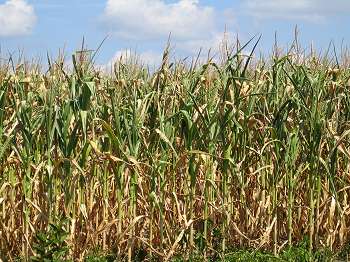- By Dan Veaner
- News
 Print
Print This summer whenever people around town talk about the weather, they say, "I really feel badly for the farmers." It has been a hot, dry summer. The drought has reduced our rainfall to less than 25% of the average, and it has been hot. "For our farm it was the worst drought that we've had since my father started farming in 1951," said Skip Hardie of Hardie Farms, Inc. in North Lansing.
But the year hasn't been a bad year for crops. "Not as bad as you would think," he added. Farmer Lin Davidson said, "They're looking for groceries for their animals. How that's going to work out, by reducing animal numbers or trucking feed in -- that's the split that people are going to have to make a decision on." But he added, "People run two to six to eight months ahead on their food, so there is some buffer in there."
Mr. Davidson, also of North Lansing, continued, "It's always a risky game, but the real thing is the spottiness of the weather. Some people got rain, some people didn't. Some got rain when they needed it, some got rain when they didn't need it. And some got rain after they needed it. So it's all over the board. Last night we got a shower with 1/2 inch of rain and South Lansing didn't see it."
Mr. Hardie agrees. "Nobody can control the weather, but our farm missed a few showers that they got a couple of miles away. Our average rainfall is in the neighborhood of around three inches a month, and for June, July and August I think we averaged less than 3/4 of an inch. And May wasn't a very wet month either." His farm is a dairy farm, so he is growing crops to feed his livestock.
He explained how the drought effects crops differently. "We grow corn and we grow alfalfa. Alfalfa is a perennial, and it's a very deep rooted crop. Basically the percentage of your crop will decrease with decreased rainfall. Corn is an annual crop, not as deep rooted a crop. It's yield is directly affected by how much moisture you get, and how much heat. This was an unbelievable year for heat, because it was a nice, hot summer. But obviously it was a very dry year."
The net effect is that "Our hay crop is probably 2/3 of normal," said Mr. Hardie, "but surprisingly enough our corn crop is close to normal."
Local farmers don't generally irrigate, even in dry seasons like this one. Mr. Davidson explained, "Some people have irrigated in the past for berry bushes and that kind of thing, high value crops per acre. But for corn and wheat, oats, soy beans, the staple crops... Sweet corn for example, that's not irrigated that I know of."
Mr. Hardie explained that one inch of rain is about 27,000 gallons on one acre of ground. "That's about a medium sized swimming pool," he said, "so if you were to irrigate a 50 acre field you'd need 50 swimming pools worth of water. And that's only one inch. If we had the ability we would have liked to irrigate maybe eight or ten inches of rain this summer."

Hardie Farms doesn't use water for irrigation, but they do need it for the cows. In fact they need quite a bit of it: 5,000 gallons every day. That's a million gallons of water every forty days. Well water doesn't work, he explains, "because the wells stink in our area." And you'd need a 20 gallon per minute well. Trucking the water would also be impractical. Tankers hold around 7,500 gallons, so you'd need three and a half tankers bringing in water every day.
To meet this need they have a water pond that holds about two and a half million gallons of water. It fills with rain water, and they take water out every day. When it gets low they pump it into the pond from Salmon Creek. "We're also very careful not to wait until the creek is really dry," Mr. Hardie says. "I would pay a lot to have public water."
Mr. Davidson said the dry Spring was actually helpful. "It was great for planting, because it was a Spring where you could get your crops in the ground. If you didn't take advantage of that early opportunity they don't look too good, because there wasn't any water."
Both men were philosophical about the weather, saying you can't control it so you do the best you can with the hand that is dealt. Mr Hardie said, "There's an old farmer's expression, 'A dry year will scare you to death, a wet year will kill you.' In actuality crops do better in a dry year. If you have a choice between a wet year and a dry year, most of the crops that we grow in this area would prefer to be dry if they had a choice."
Mr. Davidson put it this way: "It's a 'too' business. Too hot, too cold, too wet, too dry. Prices too high or prices too low." He noted that in bad years "the lenders are good to you." Farmers have options including loan programs from Pioneer Farm Credit, Farm Service Agency's (FSA) commodity loans, and disaster loans for really bad times. Crop insurance is also available along with risk management plans.
The upshot is that while we have been suffering a serious drought, it hasn't been as bad for local farmers as you might expect. More rain would have helped, though. Mr. Hardie said somewhat wistfully, "This would have been an absolutely record-breaking year for corn if we had enough moisture."
----
v1i9
----
v1i9



